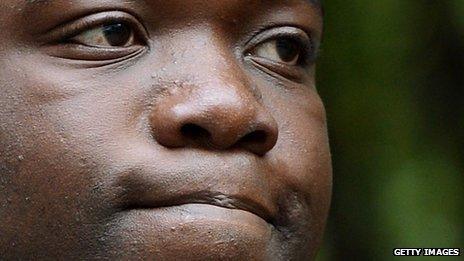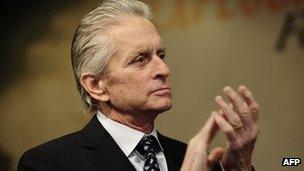The psychology of the rogue trader
- Published

What was going on in Adoboli's head?
Why do traders go rogue? Is it just a few bad apples? Or is it driven by the same thing that makes all traders tick?
Before I try to answer these questions, I should declare an interest: For six years I worked on the trading floor of an investment bank.
I wasn't a trader. But my job involved me interacting with traders on a daily basis.
I started by contacting Bruno Curnier. In 2002 he trained me, along with about 200 other fresh-faced graduate recruits, in the basics of financial markets - something he has been doing for well over a decade.
"A trader is someone whose focus is on achieving short-term profit," he tells me.
"That focus is so potent that sometimes the ends justify the means."
Profit motive?
This tallies with my own experience. For many traders, their sense of self-worth is defined almost uniquely by their "P&L" - the profit and loss they make for the bank - and, by implication, the size of their bonus.
Making a profitable trade shows that they are right. And the bigger the profit, the more right they are.
As for the enormous bonuses (and for many, Adoboli's, at £250,000, was not so enormous), their importance is not so much in the material wealth they bring, so much as the recognition of the trader's status and success.
I have known horrendously overpaid traders become very angry when they discovered they were not getting as much as an allegedly less successful colleague.
My boss once sent round an article about a monkey test that illustrated the point nicely, external.
Adoboli specifically denied being motivated by personal gain in the form of a bonus, and the jury appear to have believed him.
But he does nonetheless seem to have suffered from a fixation on profit above all else, which he claimed was because he felt under pressure to produce results.
This fixation seems evident from the confessional email he sent to his risk controller when he realised he could no longer hide his losses.
In it, he claimed that he had almost managed to succeed in recouping his losses at one point, before the market turned against him.
By that logic, it was as if he were saying he had been unlucky, as if this mitigated the fact that he had been behaving totally irresponsibly.
'Gekko syndrome'
So why do banks recruit these gamblers in the first place?
"What I have observed is a big emphasis in banks on technical competence - high cognitive ability or IQ," says Mr Curnier.
"When it comes to EQ [Emotional Quotient], my sense is that people are not spending a lot of time focusing on that."

Does the "high roller" image of Gordon Gekko attract the wrong kind of candidate?
EQ is a measure of individuals' ability to manage their emotions and their relations with others, developed by psychologist Daniel Goleman, external.
Mr Curnier says many traders suffer from "Gekko syndrome", like the "greed is good" anti-hero of the film Wall Street.
They lack self-awareness - the ability to understand their own emotions and how they affect others.
The aggressive, risk-taking, boundary-pushing, "high-roller" image of the trader tends to attract exactly that kind of applicant.
This self-selection effect can then be reinforced by a recruitment process in which the successful candidates are ultimately picked by the traders they will work for.
"I don't think some traders have any clue how to manage people. They recruit people they like - if they see the same drive," says Mr Curnier.
Indeed, many traders actively avoid promotion to managerial posts - something that would take them away from the buzz of winning in the market they know and love.
And many of the most successful traders end up being paid a lot more than their managers, sometimes even more than the head of their bank.
Aggressive
Of course, not all traders are alike, and Mr Curnier is at pains to point out that he has also met many traders with very high ethical standards.
Emma Simpson examines how former UBS trader Kweku Adoboli lost £1.4bn of his bank's money
My personal experience is that they come in three main varieties, and the variety depends very much on the type of market they work in.
The most stereotypically aggressive are the "flow" traders - people who work in the simplest, most competitive and fast-moving markets, such as currencies or shares.
Where I worked, the currency trading desks resembled an arcade. The traders had rigged their computers to blare out noises or tunes every time they bought or sold.
Then there were the "quant" traders - those dealing with financial options or complicated transactions know as synthetic CDOs.
They were brainy types, who needed to have an intuitive grip on the complex maths involved, and occasionally blew up when they got their maths wrong.
Finally, there were the "elephant hunters". These characters might spend months on one big transaction earning millions of dollars in profit.
They too were deep thinkers, but their thoughts were turned to negotiating tactics, complex legal documents and accounting issues. They also seemed to be mostly likeable family men.
Testosterone
Nearly all of the traders that I have heard of losing millions or billions (including two minor cases that never became public) fit somewhere between the first two types.
They dealt in products that were not too complex (by investment banking standards) and could be traded in large volume.
But their products were complicated enough to create risks that were poorly understood - either by the trader himself, or by the people who were supposed to be overseeing him.
Oh, and by the way, I say "him" for a reason. The vast majority of traders are men. At spread-betting firm City Index, the male-to-female ratio of punters is 10:1, external.
The reason is to do with male physiology.
According to research in 2007, external, traders are more successful when they are high on their own hormones, including adrenalin, cortisol and testosterone.
It physically gears them up for battle, making them more persistent and more willing to take risks.
Success in trading then leads to higher hormone levels and even more risky behaviour. It becomes a feedback loop, called the "winner effect".
The same effect is evident in nature - animals that win fights for alpha male status experience a testosterone rush that makes them even more willing to fight and push their way to the top. It is also well documented among athletes ahead of a game or a race.
"What I firmly believe is that financial risk-taking is a profoundly physical act," says John Coates who jointly ran the study and is himself a former bank trader.
"It's a bit like an army gearing up for a cavalry charge. If we are doing well, the body tells us: 'Go for it, there's fruit everywhere'."
The downside is that it makes the winner stupidly reckless - Mr Coates says that when traders blow up, it typically comes at the end of a long winning streak.
And this is what seems to have happened with Adoboli.
Having successfully hidden a permissible, albeit embarrassing, $400,000 loss in 2008, Adoboli went on to take bigger and bigger bets, ultimately resulting in a loss 5,000 times bigger in 2011.
Away from the bank, he was even taking extra bets with his own money, leading the prosecution to accuse him of being "addicted to gambling".
Doubling down
The last piece of the psychological puzzle is the mental trap that a rogue trader finds himself in once the losses start stacking up and he faces an impending deadline at which point the game will be up.
It presents him with a classic game of double or quits.
He can either:
Confess his losses, or
Double his bet in the hope of quickly making back the loss before he is discovered
The problem for the bank is that, beyond a certain point, the trader's losses are in effect capped: He knows that the worst that can happen to him is that he loses his job and faces criminal charges.
Meanwhile, the billions in losses will have to be picked up by the bank - although this did not stop Societe Generale successfully (at least on paper) winning damages against Jerome Kerviel for the entire 4.9bn euros he had lost.
In the first scenario, the trader's worst case happens with 100% probability, whereas in the second, it is only 50%. Unsurprisingly, he goes for option 2.
If he is really unlucky, he keeps having to double up again and again, until the losses become astronomical.
In Adoboli's case, he changed his bet twice, and both times the market changed direction against him.
It just makes you wonder how many lucky rogue traders there have been that never came to light.
- Published20 November 2012
- Published20 November 2012
- Published20 November 2012